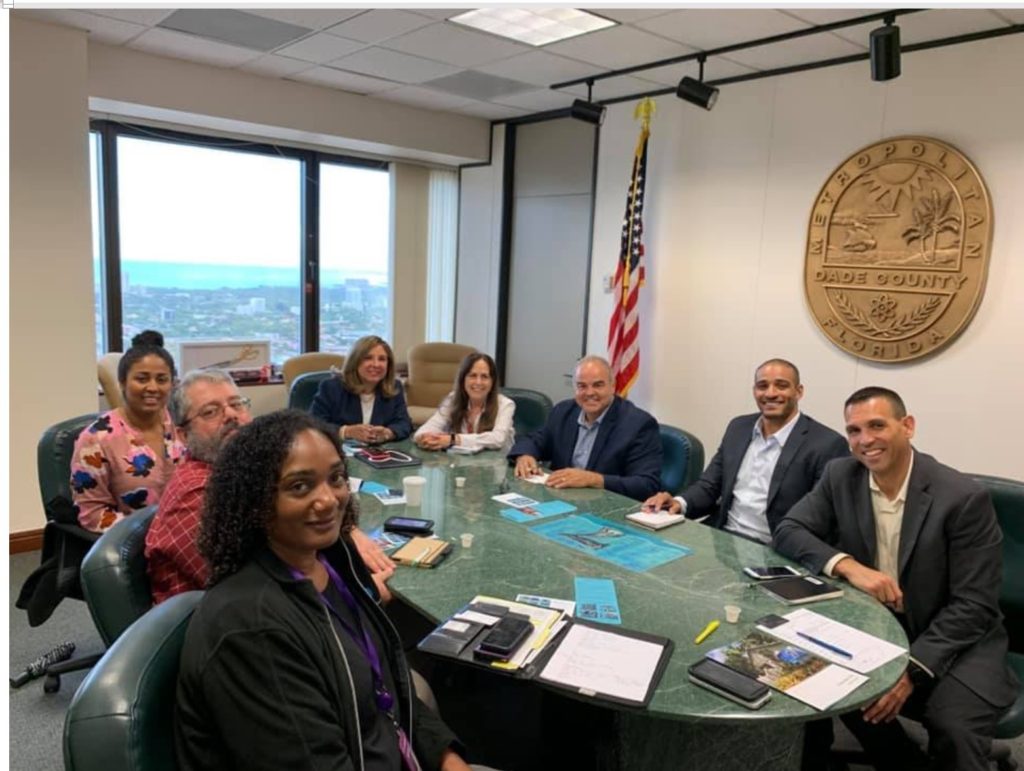
Home » Projects » Trash Talk » Methodology

Trash Talk takes a multi-‐faceted approach in order to transform people into eco emissaries. The project is a conveyor of people, gathering, galvanizing, and empowering them to do the collaborative work it will take to stave off the systemic problem of recycling contamination.
The project starts small. Trash Talk will begin by activating interested individuals in Miami-‐Dade County, where the recycling contamination rate is 40%—which is 15% above the already high national average of 25%. This will be done in two primary ways: an interactive art exhibit and through community partners.
Art Exhibition: The interactive art exhibit will be created by Cortada and will be displayed at Pinecrest Gardens. It will crystalize the issue of waste and contamination for attendees through multimedia art so that the issue cannot be ignored. To do so, the exhibit will feature materials that cannot be recycled in order to highlight the diversity of our waste. Video content will also be developed and displayed to creatively show the varying scenarios that lead to recycling contamination, such as wish cycling, which is when people recycle an item because it appears to be, and they hope it is, recyclable but in actuality the item does not belong in the blue bin. The exhibition will also educate attendees about how to Recycle Right so they do not just leave with awareness but also with the tools to do better.
Collaboration and partnerships: Working with community partners, such as schools, farmer’s markets, and nonprofit organizations, brings attention to the issue of waste and recycling and engages with individuals so that they have the knowledge and resources to change their ways. By partnering with groups, Trash Talk goes beyond the physical restrictions of an art exhibit as the project can then be presented outside of museums and in other types of centers for engagement. It then becomes an art project whose impact can increase exponentially because through partners, the number of people who the project reaches increases exponentially. But Trash Talk’s impact will not end there.
Participatory public art: A key component of Trash Talk will be the “Check on your bin” effort, which will involve residents placing an artistic check mark on their recycling bins once they have mastered the art of recycling. This will render the bins strange to those unfamiliar with the project and prompt a conversation where neighbors can educate neighbors about recycling contamination. People who attend the exhibit and presentations with community partners will be the starting point for this effort. Through their engagement these people will learn the art of recycling and receive a check mark to put on their bins when they go home, along with door hangers and palm cards that they can share with their neighbors. In this way, Trash Talk will empower individuals to educate those around them. As a result, the knowledge of a small group who was initially activated will spread, again increasing the number of people the project reaches, and therefore its impact.
Online Platform: With these components alone, however, Trash Talk’s reach is still limited to those in proximity to the project, its partners, and its initial participants. For this reason, another component is necessary for the project to spread: an online platform.
Through Trash Talk’s online platform, education between neighbors and engagement with the project can easily spread and be sustained as tools for learning how to recycle right which are then readily available to anyone. The site will feature the video content from the exhibit, a quiz so that more people can Check their bins and master the art of recycling, links to relevant news regarding waste and recycling, and a discussion forum and blog so that people can interact and ask questions. It will also include PDFs of the palm cards, door hangers, and check mark labels, as well as informational PDFs about proper recycling, so that neighbors can easily continue to educate neighbors. Trash Talk will also allow participants to sign up for digital newsletters so that we can continue to engage them. Additionally, links to other organizations will be made available on the site to deepen participants’ engagement with environmentalism.
Trash Talk Captains: Participants will also be given the opportunity to more deeply engage with Trash Talk by becoming Trash Talk Captains for their neighborhood. These people will serve as leaders and catalysts for the project on their block, working intentionally to increase engagement and awareness in their surrounding community. This will help to sustain the project as it grows and allow for local engagement no matter how large the project becomes.
Growing a cadre of engaged citizens: By calling attention to recycling through an artistic participatory project and creating pathways for people to deeply engage with the issues surrounding recycling and waste, we hope to inspire participants to impart their knowledge to their community in their own innovative and creative ways. Recycling contamination is an extremely important issue to address because it adds to the waste polluting our planet as recycled materials then end up in a landfill. It also increases the costs of recycling due to the additional time and energy needed at the facilities, which then creates financial barriers to recycling for local governments.
Working together, learning together: Together, individuals can effectuate change if they take action. Trash Talk is a platform that empowers them to do so. It’s time we start talking about trash.